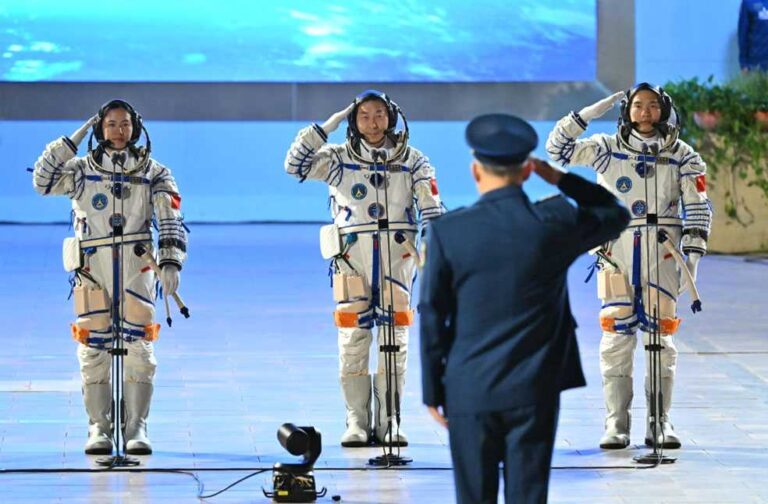Beijing: China celebrates the successful launch of its youngest crew of astronauts, including the first female space engineer, has successfully docked after a six-hour journey to the space station. This marks a significant milestone in its space exploration efforts.
The crew will utilize the homegrown space station as their base for six months to conduct experiments and perform spacewalks, as Beijing works to gain experience and knowledge for its goal of landing humans on the Moon by 2030.
Beijing has declared the launch of Shenzhou 19 a “complete success,” marking it as one of 100 planned launches in a record-setting year for space exploration, as China aims to surpass its rival, the United States.
Earlier this year, NASA chief Bill Nelson said the US and China were “in effect, in a race” to return to the Moon, where he fears Beijing wants to stake territorial claims.
He told legislators that he believed their civilian space programme was also a military programme.
The pilot of the mission, Cai Xuzhe, a seasoned veteran, is accompanied by a new generation of taikonauts born in the 1990s, including Wang Haoze, China’s first female space engineer.
“Their youthful energy has made me feel younger and more confident,” Xuzhe shared with the media before take-off.
The three taikonauts of the #Shenzhou19 crewed mission, Cai Xuzhe (C), Song Lingdong (R), and Wang Haoze, met the press on Tuesday. The crew will set off on their space mission on Wednesday. Good Luck! pic.twitter.com/VzmbgDDe5E
— China Science (@ChinaScience) October 29, 2024
All three astronauts expressed their profound sense of national pride, highlighting that this is China’s “youngest crew” to date. This marks the emergence of a new generation of space travellers and signifies an investment in the country’s future.
China has already chosen its next group of astronauts, who will undergo training for potential lunar missions and to serve on the space station.
China has recently been making headlines for its space program, showcasing its growing achievements. Earlier this year, the country successfully retrieved rock and soil samples from the far side of the Moon, marking a historic milestone. In 2021, China safely landed a spacecraft on Mars and deployed its Zhurong rover, becoming only the second nation to achieve this feat.
Additionally, China has a fleet of satellites in orbit and plans to launch many more. In August, it sent up the first 18 satellites of what it envisions as a constellation of 14,000, aimed at providing broadband internet coverage from space to compete with SpaceX’s Starlink.
Elon Musk, the CEO of Starlink, acknowledged on his platform X that China’s space program is more advanced than many realize. However, some U.S. officials express concerns that this technology could potentially be weaponized.



